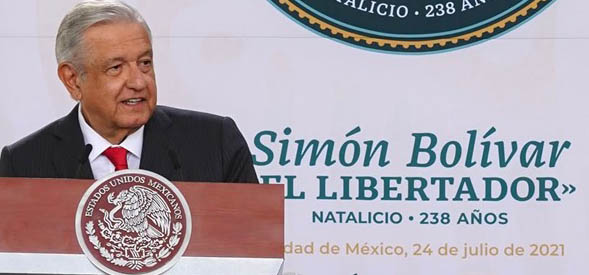|
|
|
|
The weekly newsletter of the México Solidarity Project |
|
|
|
August 4, 2021/ This week's issue/ Meizhu Lui, for the editorial team |
|
|
AMLO’s New Bolivarian Vision for Latin America |
|
Simón Bolívar, the Liberator of much of Latin America, promised his teacher, social reformer Simón Rodríguez, that he would “not rest his body or soul until he had succeeded in liberating the Spanish-American world from Spanish tutelage.” At a México City event celebrating Bolívar July 24, 2021, Mexican President Andrés Manual López Obrador challenged Latin American foreign and prime ministers to apply Bolívar’s spirit to today’s foremost hemispheric task: liberating the Latin-American world from US tutelage.
AMLO began his address tracing the history that led US President James Monroe to proclaim in 1823 the doctrine that bears his name, the notion that the US should never, as Thomas Jefferson had put it earlier that year, “allow Europe to meddle in affairs on this side of the Atlantic.” But that policy of “America for the Americans,” Obrador went on to note, “ended up disintegrating the peoples of our continent and destroying what Bolivar had built.” The meddling — “constant occupations, invasions, annexations” — would come from the United States.
What AMLO said next strikes us as so politically significant that we want to highlight right here, instead of our usual weekly introduction, the exact words he had to say. For AMLO’s entire speech, check this video of his presentation in Spanish and this English translation.
Now is the time for a new coexistence among all the countries of the Americas. We must put aside the dilemma of either integrating with the United States or opposing it defensively. It is time to explore another option, that of having a dialogue with US leaders and convincing them that a new relationship between the countries of the Americas is possible. At present there are excellent conditions to achieve this goal of going forward together without anyone being left behind. We have powerful reasons to assert our sovereignty and demonstrate with arguments and without idle chatter that we are not a protectorate, a colony or their backyard. Furthermore, a factor favorable to our country has gradually been accepted: China's disproportionate growth has strengthened the opinion in the United States that we should be seen as allies and not as distant neighbors. We must jointly define very precise goals; for example, to stop rejecting migrants, mostly young people, when in order to grow we need a labor force that, in reality, is not sufficiently available in the United States or Canada. Why not study the demand for labor and open the migratory flow in an orderly manner? And within the framework of a new joint development plan, we should consider policies on investment, labor, environmental protection and other issues of mutual interest to our nations. The proposal is no more and no less than to build something similar to the European Union, but in accordance with our history, our reality, and our identities. |
|
In this spirit, the replacement of the OAS by a truly autonomous organization, not a lackey of anyone, but a mediator at the request and acceptance of the parties in conflict, in matters of human rights and democracy, should not be ruled out. |
|
|
What is proposed here may seem utopian. However, without the horizon of ideals we will get nowhere and, consequently, it is worth trying. Let’s keep Bolívar’s dream alive. |
|
|
Javier Bravo, a co-founder of the México Solidarity Project, teaches at the University of Guanajuato. He came to the United States on a fall 2019 speaking tour to explain the significance of the election of AMLO and Morena. Covid last year cancelled a second tour. An activist in Morena’s left, Bravo has been working to help us understand whether and how Morena can transform México into a sovereign nation governed by and for its poor and working classes.
Some feel that AMLO has been too appeasing toward the US. Does the speech he delivered July 24 to the Community of Latin American and Caribbean States help explain his approach to US relations? |
|
|
That speech does help. It is an elegant invitation for the United States to leave behind its colonialist and imperialist foreign policy. AMLO is trying at all costs to avoid confrontation with the nuclear superpower that is México’s commercial partner, a confrontation that would make it impossible for him to govern.
A basic principle of Latin American de-colonial politics has always been feasibility: proposing and making changes that are possible. They may be only small changes, but they are the ones that are possible when big changes are not. Quantitative change can become qualitative: Small changes can produce in the end something essentially different from what we had at the start. Feasibility allows transforming reality without risky ruptures. Alternating praise for President Biden with invitations for him to end the blockade of Cuba creates new psychological and political conditions.
As a Morena activist, do you see AMLO as too optimistic? Do you agree that Latin America need not choose between integrating with the US or defensively opposing it, that it has a third way?
AMLO is not optimistic. He is hopeful. He is striving to generate hope, not optimism, because optimism tends to assume that things aren’t really as bad as they might appear. But hope commits us to creating new conditions of dignified life for all people. AMLO is proposing a new hemispheric consensus around principles of politics very different from the colonial logic of domination that revolves around the politics of center and periphery. Hope helps us discard the choice between “integrate” or “oppose.” AMLO argues that the “third way” for the Americas, including the US, must be the very first way.
AMLO speaks of the USMCA trade agreement, the 2020 successor to NAFTA, as a model agreement for a new, mutually beneficial relationship, an example of that “third way.” Do you agree? Or does the USMCA limit México's sovereignty and let US corporate interests override the well-being of Mexican workers and farmers?
The excessive dependence of México on the United States economy will always be detrimental, but President López Obrador speaks continually about the benefits of the USMCA because this remains the agreement he has. The USMCA does have positive elements. It offers an opportunity to raise wages in México and reduce the disparity with Canada and USA, an opportunity to standardize union policies and avoid chiefdoms and corruption in working-class organizations. AMLO cannot cancel the USMCA. What he can do: boost the positives on the one hand and try to offset the negatives on the other.
AMLO is a realistic leader who takes advantage of the possibilities for greater maneuverability, while controlling for potential damage. But he is also a visionary, never losing sight of the new society that is our eventual goal. |
|
|
Horizontal Vertigo: A City Called México |
|
Juan Villoro’s interpretation of the Americas’ most extraordinary city offers readers the perspective of a well-traveled insider, as historian Daniel Rey explains in this review, originally published by the North American Congress on Latin America (NACLA).
How enormous has the Mexico City metropolitan area become? In 2001, it almost had two time zones. Back then, the then head of the government for the Federal District, Andrés Manuel López Obrador — now the Mexican president — refused to comply with President Vicente Fox’s proposal for daylight savings time. |
|
|
If this quarrel had not been settled, residents of the México City metro area would have gained or lost an hour merely by crossing the street in the parts of the city that divide the Federal District from the state of México.
A Supreme Court decision would eventually prevent this confusion, but the dual-time zone prospect remains an apt metaphor for Mexico City’s vast heterogeneity. This is a place, writes Juan Villoro in Horizontal Vertigo, where millions of people “live in millions of different ways.”
In this profile of our hemisphere’s largest city, Villoro, an acclaimed writer who helped draft the capital’s constitution, offers his interpretation of the Americas’ most extraordinary city. He traces the city’s history from Indigenous antiquity to the Aztec period, from the Spanish conquest to the present. This past May, Pantheon, an imprint of Penguin Random House, published an English translation by Alfred MacAdam.
Horizontal Vertigo can be at times a devastating critique of Mexico City’s political leaders and their top-down, or vertical, approach to democracy. Of the 8.1-magnitude earthquake in 1985 that killed 10,000 people, Villoro writes: “The earth carried out the scrutiny the government would never conduct.” A generation later, it took the H1N1 epidemic of 2009 for the government to realize that 50,000 of the capital’s schools lacked running water.
Villoro’s final chapter, a moving reflection on the 2017 earthquake, criticizes the real estate speculation that has buildings over 20 stories getting “constructed on terrain softened by mud and subject to seismic shifts.” That construction is allowed, says Villoro, because of the “economic benefit urban developers reap and the resulting support they contribute to those who govern the city and hope to govern the nation.” |
|
|
Recent news reports and commentaries, from progressive and mainstream media,
Gabriela Soto Laveaga, Every American needs to take a history of Mexico class, Washington Post. A Harvard historian explains why learning the history of Mexico can help Americans better understand themselves.
Jorge Gómez Naredo, ¿Por qué la consulta popular fue un verdadero éxito? Polemón. La consulta fue un éxito porque tuvo una votación de más de siete millones de personas a pesar de una intensa campaña por desacreditarla.
John Ackerman, De la consulta a la justicia, La Jornada. Si Morena no estuviera hoy congelado en la ilegalidad y carcomido por el elitismo y el burocratismo, los resultados electorales de la consulta popular sin duda hubieran sido mucho más favorables.
Christine Murray, Mexico's ban on subcontracting aimed to help workers: Is it succeeding? Thomson Reuters. Over two million Mexicans are already reaping the benefits of a new law that bans labor subcontracting. But some workers are falling through the cracks.
Manuel Pérez-Rocha Loyo, Riesgos en la renegociación del TLC con la UE, La Jornada. El gobierno de la 4T debe asegurar en la renegociación con la UE una participación amplia de sectores sociales y comunidades afectadas.
Mexican president says Biden must “make decision” on Cuba embargo, Reuters. AMLO calls it “not conceivable” in these times “to punish an independent country with a blockade.”
Sam Pizzigati, America’s Billionaires: Borrowing Their Way to Ever More Fabulous Fortunes, Inequality.org. The great Mexican painter Diego Rivera would not appreciate what the USA's richest are using for collateral these days.
Mining CEOs outline Mexico risks, rewards, Bnamericas. Global mining company execs see more risks to profits under the Morena government, but find México’s skilled labor, contractors, and suppliers too valuable to pass by.
AMLO to decree the release of thousands of unsentenced inmates, Yucatan Times. Mexico’s president plans to issue a decree that could release hundreds or thousands of elderly inmates and those who have spent ten years or more in prison and have not been convicted of any violent offense. |
|
|
The Mexico Solidarity Project brings together activists from various socialist and left organizations and individuals committed to worker and global justice who see the 2018 election of Andrés Manuel López Obrador as president of México as a watershed moment. AMLO and his progressive Morena party aim to end generations of corruption, impoverishment, and subservience to US interests. Our Project supports not just Morena, but all Mexicans struggling for basic rights, and opposes US efforts to undermine organizing and México’s national sovereignty.
Editorial committee: Meizhu Lui, Bruce Hobson, Bill Gallegos, Sam Pizzigati. We welcome your suggestions and feedback. Interested in getting involved? Drop us an email! |
|
|
|
Web page and application support for the México Solidarity Project from NOVA Web Development, a democratically run, worker-owned and operated cooperative focused on developing free software tools for progressive organizations. |








